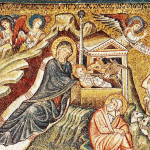We run our website the way we wished the whole internet worked: we provide high quality original content with no ads. We are funded solely by your direct support. Please consider supporting this project.

Jesus, the New Israel
The Gospels present Jesus and the Kingdom he inaugurated as the fulfillment of Israel’s story. For example, Jesus’ birth fulfills Israel’s longing for a Messiah; his return from Egypt as a child mirrors their Exodus out of Egypt; his temptations in the desert allude to Israel’s temptations in the desert; his twelve disciples recall the 12 tribes of Israel; Jesus’ five sets of teachings in Matthew are a parallel of Moses’ Pentateuch; his sufferings fulfill the call of Israel to be a suffering servant, and his resurrection completes the hoped for resurrection of Israel. In sum, the Gospel authors see Jesus as “the appropriate ending” of the story of Israel, as NT Wright notes. Remembering that “Son of God” was a title for Israel as well as of the Messiah, the life, death and resurrection of God’s Son in the Gospels must be understood as “the climax of [Israel’s] election as well as the fullest self-revelation-in-action of the sovereign God.”[1]
All the Gospel authors, but especially Matthew, see various details of Jesus’ life as fulfilling certain details in the OT narrative. While there are a few passages in which it is clear these authors believed Jesus fulfilled something that was predicted in the OT, the vast majority of examples cannot possibly be understood along these lines. They rather reflect the thoroughly Christocentric perspective of these authors on the OT. Here I want to illustrate this point with two examples from Matthew.
Matthew’s Christocentric Interpretation of Rachel’s Weeping. The first example I want to highlight is found in Matthew 2:16-18. Here we read how Matthew interprets the wailing of mothers in Bethlehem after Herod’s massacre to be the fulfillment of parents wailing as they journeyed through Ramah as they were being deported to Babylon. This is a reference back to Jeremiah 31:15. It’s evident that Matthew was not suggesting that the Jeremiah passage predicted the Bethlehem massacre, for there is, in fact, nothing predictive about Jeremiah 31:15. Rather, reflecting an intensely Christocentric focus, Matthew understands the wailing that surrounded the birth of Jesus to be the quintessential expression of the sort of wailing Jewish mothers have often endured at the hands of Gentiles, as expressed in Jeremiah 31:15. If the application strikes us as a stretch, this simply reflects the fact that we don’t share Matthew’s interpretive strategy or the intensity of his Christocentric conviction that the real significance of every passage is the significance it has in the light of Christ.
Matthew’s Christocentric Fusion of Two Texts. The second example is found in Matthew 21:1-5, which narrates Jesus’ entrance into Jerusalem. Here Matthew sees this act as the fulfillment of two awkwardly spliced together verses from Zechariah and Isaiah (Zech. 9:9; Isa 62:11). Matthew is again not suggesting these passages predicted Jesus’ entrance, for there is in fact nothing predictive about either passage. Rather, in Jesus’ royal-yet-humble entrance into Jerusalem, Matthew sees the supreme expression of the sort of king Israel has always longed for, as reflected (in Matthew’s mind) in the two passages he splices together.
Perhaps even more significantly, we should note that the Zechariah portion of the Scripture Jesus “fulfills” in Matthew is taken from the Septuagint. While it’s apparent that the “donkey” and “colt” in the original Hebrew of Zechariah 9:9 is an example of Hebraic parallelism and thus refers to one animal, the translators of the Septuagint for some reason inserted a kia (“and”) between the donkey and colt, thereby rendering them as two different animals. Following this translation, Matthew rewrote Mark’s account (assuming Markan priority) to portray Jesus as somehow riding into Jerusalem on both animals (Mt 21:7). For the same reason Matthew modified Mark’s account of the disciples finding the donkey to include her colt (Mk 11:2-3//Mt 21:3).
From our vantage point, Matthew’s interpretive technique and the unusual depiction of Jesus that results from it can’t help but seem forced, perhaps to the extreme. For some readers, they may also raise questions about the meticulous historical accuracy of Matthew’s portrait and thus about the inspiration of his account. These questions need not detain us presently, however, for our only interest concerns the manner in which Matthew’s interpretation reflects the intensity of his Christocentric convictions.
This just illustrates how everything in Scripture—even, apparently, the insertion of a kia (“and”) in the Septuagint—is assumed to bear witness to Jesus and thus to find its fulfillment in Jesus. Jesus brings God’s dealings with Israel throughout the OT to a climatic fulfillment, and so any aspect of Jesus’ life that in any way has a parallel in the OT is seized by the Gospel writers as “fulfillment” of that parallel.
[1] N.T. Wright, “Christian Origin’s and the Question of God,” in Engaging the Doctrine of God: Contemporary Protestant Perspectives, ed. B. McCormack (Grand Rapids, MI: Baker Academic, 2008), 21-36.
Photo credit: StateofIsrael via VisualHunt / CC BY-SA
Category: General
Tags: Israel, Jesus, Old Testament
Topics: Biblical Interpretation, Christology
Related Reading

Responding to Driscoll’s “Is God a Pacifist?” Part I
I’m sure many of you have read Mark Driscoll’s recent blog titled “Is God a Pacifist?” in which he argues against Christian pacifism. I’ve decided to address this in a series of three posts, not because I think Driscoll’s arguments are particularly noteworthy, but because it provides me with an opportunity to make a case against what I’ve…

The Starting Point for “Knowing God”
While it makes sense that Hellenistic philosophers embraced knowledge of God as the simple, necessary and immutable One in an attempt to explain the ever-changing, composite, contingent world (see post here for what this means), it is misguided for Christian theology to do so. By defining knowledge of God’s essence over-and-against creation, we are defining God’s essence…

Reflections on Divine Violence in the Old Testament
As some of you know, for the last five years I’ve been working on a book addressing the problem of divine violence in the OT. (For alleged violence in the NT, see Thomas R. Yoder Neufeld, Killing Enmity: Violence in the New Testament (Baker Academic, 2011). It will be a highly academic tome, approximately 600…

The Cross in the Manger
There has been a strand within the Western theological tradition—one that is especially prevalent in contemporary American Evangelicalism—that construes the significance of the cross in strictly soteriological terms. The cross is central, in this view, but only in the sense that the reason Jesus came to earth was to pay the price for our sin…

God’s Dream for the World
The future doesn’t yet exist—which is why it’s future instead of the present or past—this doesn’t mean I’m claiming the future is wide open. To the contrary, it’s very clear from Scripture that God has a great plan for the future, and this plan steers the course of history by setting limits on what can…

The Only Starting Point
Sree V. Remella via Compfight Our friend Roger Olson wrote a great article on placing Jesus first when constructing a statement of faith. It might seem like a small thing, but it deeply matters what we place as primary in matters of faith. Let’s always begin with Jesus. From Roger’s blog post: What are we…
